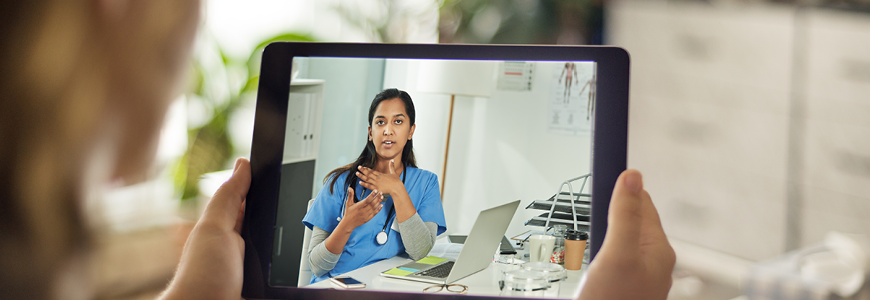The Duke Lung Transplant program is expanding patient outreach by securing state licenses that allow transplant pulmonologists to use telehealth to communicate with patients outside North Carolina.
The use of telehealth soared during the COVID-19 pandemic and, as a result, many states waived restrictions governing telehealth communications with out-of-state patients to reduce the risks of travel.
But late in 2021, as the effects of the pandemic waned, many states restored the licensure requirement, says John M. Reynolds, MD, medical director of the lung transplant program. Duke is one of only a few lung transplant programs in the nation investing in licenses to maintain the telehealth options for out-of-state patients.
“Like many other programs, we embraced telehealth during the pandemic, but we also recognize its long-term value to our out-of-state patients,” Reynolds says. “Now that the states are restoring license requirements, we feel it’s important to secure licenses that allow us to continue offering the service.”
Reynolds and Katherine A. Young, MD, a transplant pulmonologist and critical care specialist, have secured licenses either individually or jointly in 17 states with additional state licensures pending to allow the pulmonologists to use telehealth to maintain contact with patients following transplant and to help introduce potential patients to Duke.
In addition to states contiguous with North Carolina, the team has secured license in larger states as well, including New York, Florida, Pennsylvania, Michigan and others. More are in process across the U.S.
The Duke Lung Transplant Program is among the most established and successful in the world. Our experienced team understands all aspects of lung transplant care and is
here to help you care for your patients.
Patient convenience and safety drive telehealth growth
Convenience and safety are the key reasons patients cite a preference for telehealth, Young says. “Particularly for patients who are considering a program for a future transplant, telehealth offers a convenient alternative.”
“Remote communication allows the patient and family to meet the physician and learn about the program and the team,” she adds. Avoiding the risks of infection and expense of travel is a key advantage, Young says. Some patients must find an out-of-state option because their home states do not have medical centers offering lung transplants.
Both Reynolds and Young say telehealth offers a pathway to expand the transplant program. “When a patient who requires a transplant is considering a program, the key is building a relationship with the clinical team while reducing the risk of travel,” Young says.
Telehealth offers “a simple, hassle-free way” to build relationships on the intake side, Young adds. “We hope over time they will come to us for the procedure and allow us to manage their long-term risk.”
Patients benefit from pre-transplant evaluation at a high-volume transplant center nationally. As the nation’s largest lung transplant program by total volume, Duke has performed 2,362 lung transplants through September 2022, according to the Organ Procurement and Transplantation Network.
The program also offers one of the shortest median wait times for transplant in the United States—15 days compared to the national average of 64 – according to the Scientific Registry of Transplant Recipients data from July 2022.
